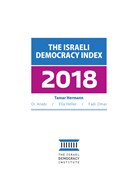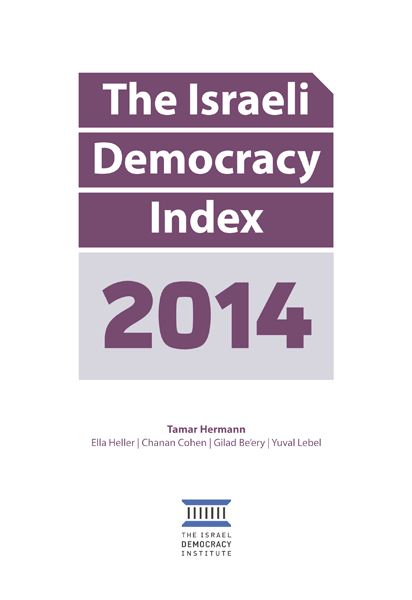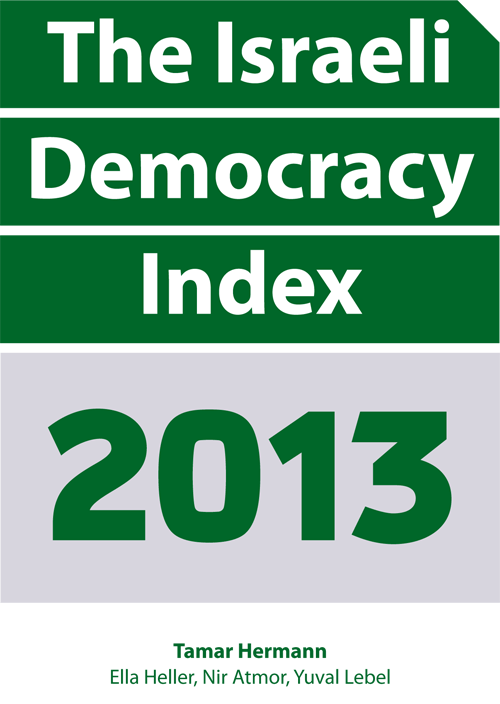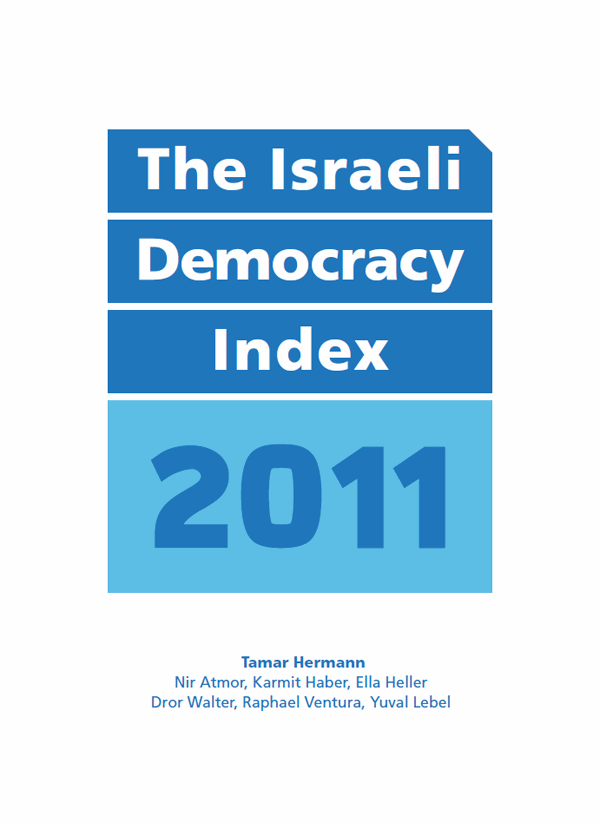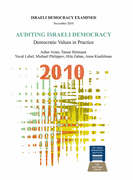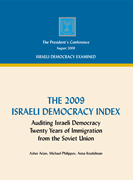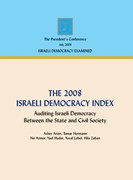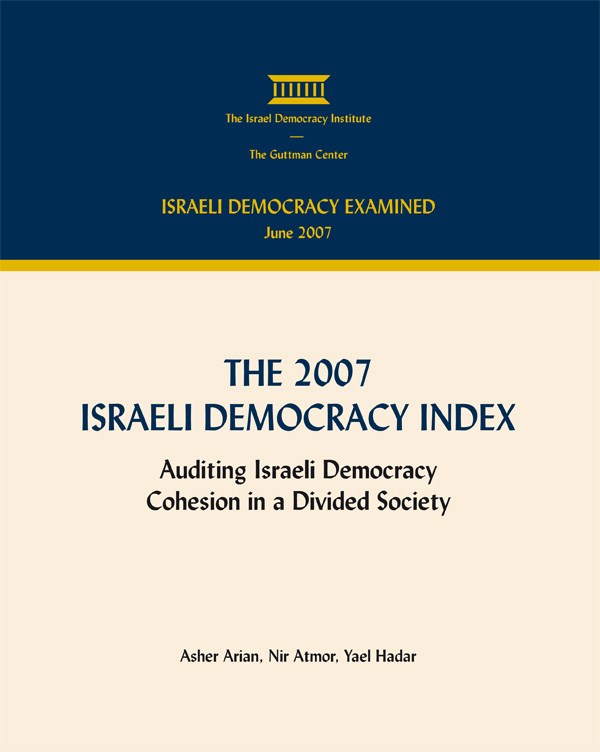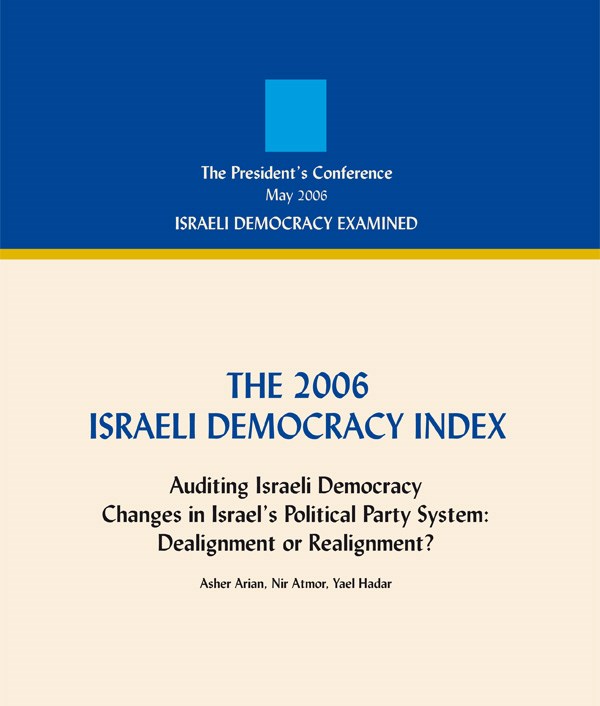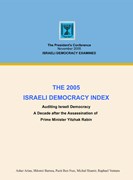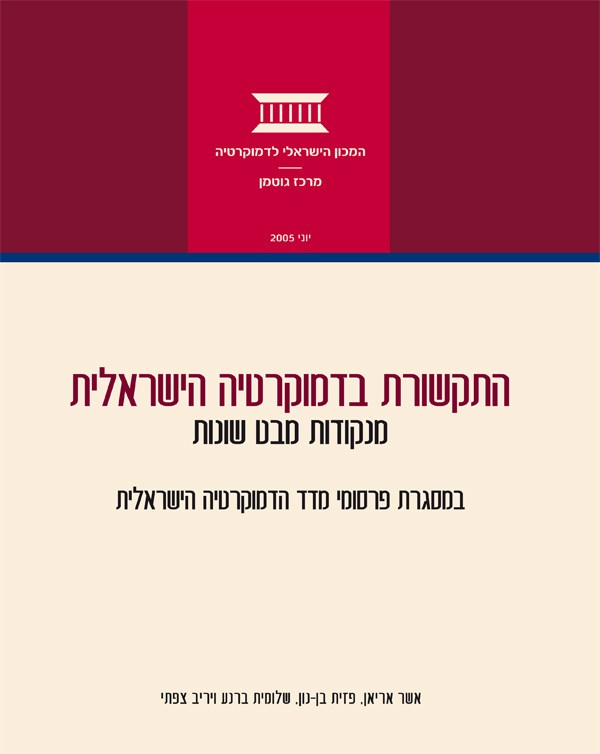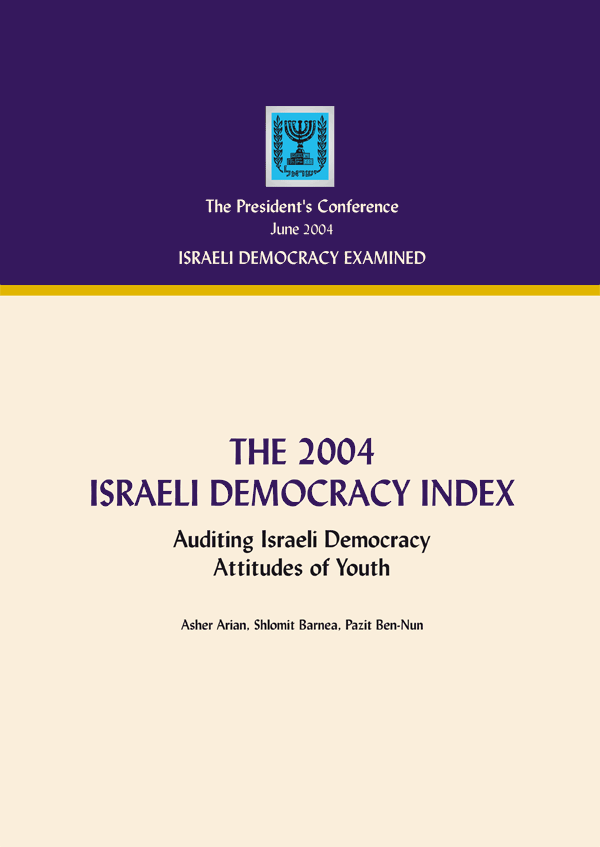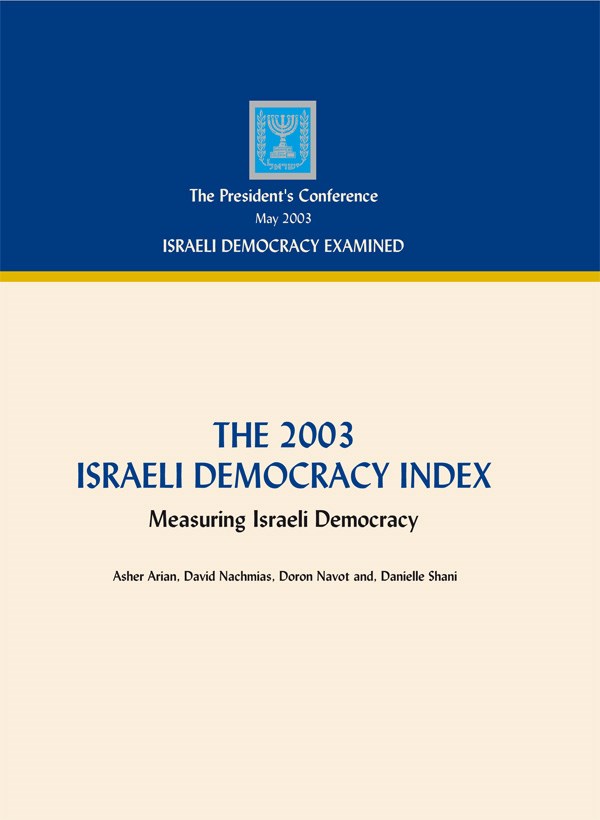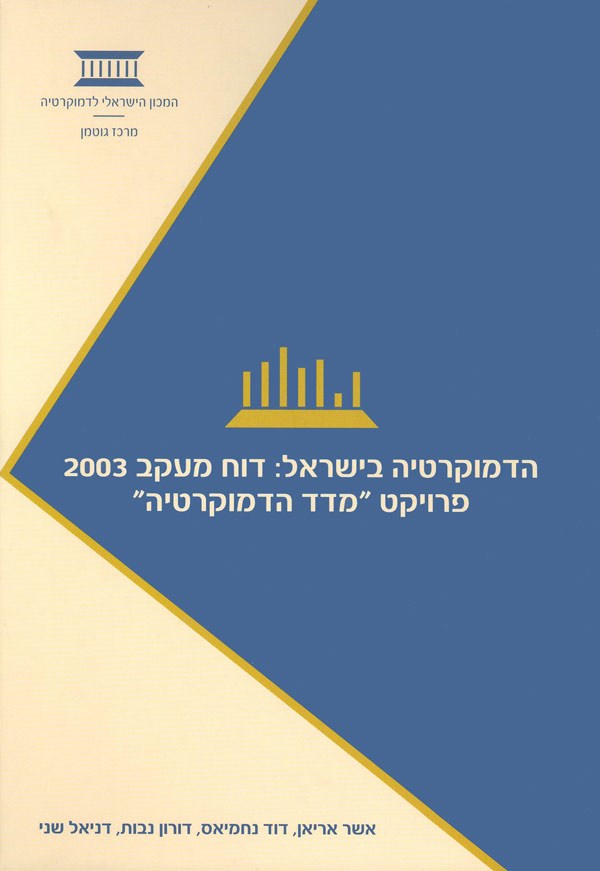

Publications Regarding Confidence in the Knesset
Articles

Could Sderot Have the Same Standing as Tel Aviv? Perhaps If We Reform the Electoral System
Written By: Dr. Assaf Shapira, Prof. Gideon Rahat
Israel is the only OECD member that has neither regional elections nor a personal element in the electoral system. This is not simply a technical issue but has far-reaching implications relating to the quality of representation and the obligation elected officials have toward their voters.

A majority of Israelis think that Israel is currently in a state of emergency
Written By: Prof. Tamar Hermann, Dr. Or Anabi
The July 2023 edition of the Israeli Voice Index finds that 58% of Israelis believe the country is in a "state of emergency." Only a small minority of Israelis believe that IDF reservists, who fail to report for duty in protest of the judicial overhaul, should be dismissed.

Six Months In, Government Gets Low Grades in All Areas
Written By: Prof. Tamar Hermann, Dr. Or Anabi
As the government completes its first six months in office respondents were asked to rate its performance in various fields.

Two States for One People? Israelis Want to Stay United
Written By: Prof. Tamar Hermann, Dr. Or Anabi
Trust in the Supreme Court remains steady, while the share of Israelis who trust the Knesset has almost doubled since last year. Opinions on the likelihood of the government completing its term are fairly evenly divided in the Jewish public.

Appointment of Judges to High Courts in Democratic Countries: A Comparative Study
Written By: Prof. Amichai Cohen, Dr. Guy Lurie
The research examined 42 countries included all the OECD member states along with other leading democratic countries.

Majority Think 2nd Lockdown was Politically Motivated
Written By: Prof. Tamar Hermann, Dr. Or Anabi
55 percent of Israelis believe that the second lockdown was solely or mainly politically motivated; The majority of the public continues to express confidence in Prof. Gamzu; Continued increase in public concern about the economy

PM Under Indictment - A Dangerous Precedent
Allowing Netanyahu to form a government would constitute a conflict of interest and would result in a negative and irreversible precedent for the rule of law
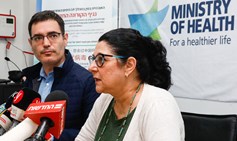
Most Israelis Trust Government Health Officials on Corona
IDI Coronavirus Survey finds that nearly half the population is pessimistic about Israel’s economic prospects

Coronavirus Special Survey
Special Coronavirus survey by the Israel Democracy Institute takes the Israeli pulse on the impact of the Coronavirus finds that 40% of Israelis feel they are experiencing high levels of stress and 65% are worried about their financial future.

Speaker of the Knesset's Resignation - Statement
Yohanan Plesner, President of the Israel Democracy Institute, reacted to the Speaker of the Knesset Yuli Edelstein's resignation

Parliaments Around the World
Written By: Dr. Chen Friedberg, Avital Friedman, Dr. Assaf Shapira, Dr. Shany Mor
As the Knesset struggles to resume its work, IDI took a look at how parliaments around the world are putting into place processes and mechanisms that enable them to operate during the coronavirus pandemic so they can fulfill the vital role they play in democracies.

The Functioning of the Knesset during the Coronavirus Emergency
Written By: Dr. Chen Friedberg, Avital Friedman, Dr. Assaf Shapira, Dr. Shany Mor
In this paper, we argue that in a public health emergency, such as the one we are experiencing now, when unprecedented means are being employed in the fight against COVID-19, the Knesset’s smooth functioning is even more essential, especially with regard to the need for strict and effective oversight of the government.

Convene the Knesset Plenum Without Delay - IDI Statement
IDI Statement to Knesset Speaker Yuli Edelstein: Convene the Knesset Plenum without delay; failure to do so blatantly exceeds the bounds of your office and constitutes an unacceptable disregard for basic rules of democracy

Private Member Bills: A Review and Recommendations
Written By: Dr. Chen Friedberg
Since the early 2000s, we have seen an unusual rise in the number of private member bills submitted to the Knesset

Rabbis in Politics—A Disaster for Both
Written By: Dr. Shuki Friedman
Rabbis are not necessarily any better or worse than other politicians.

It Boils Down to Netanyahu’s Conspiracy Theories
Written By: Prof. Yedidia Z. Stern
Given the dark insinuations in the PM's request for Knesset immunity, a vote in his favor would be a vote of no-confidence in the rule of law

A Vote of Confidence in the Rule of Law
Written By: Prof. Yedidia Z. Stern
Regardless of the decision regardin PM Netanyahu's request for immunity - the debate will revolve around the more important question: the status of the rule of law in Israel

IDI Releases 2019 Democracy Index
Written By: Prof. Tamar Hermann, Dr. Or Anabi, Dr. William Cubbison, Ella Heller
50% of Israelis Believe that the State of the Country is 'Good'. Conversely: 58% of Israelis Believe that Their Leadership is Corrupt and 59% of Israelis Think that Supreme Court Judges’ Rulings are Politically Biased

A Decade of Anti-Democratic Legislation
Written By: Dr. Amir Fuchs
The last decade in Israel has been marked by a wave of legislation that has dealt a blow to the country’s democratic values, the rule of law, and separation of powers.

The Knesset is not a Sanctuary
Written By: Dr. Amir Fuchs
This claim was first put forth in a letter from the Knesset’s legal adviser, Eyal Yinon, to the speaker of the Knesset with regard to the situation of MK Haim Katz.

Justice in the Courtroom, Not in the Streets
Written By: Prof. Yedidia Z. Stern
Our level-headed, intelligent, rational prime minister has lost his good judgment and is inciting against some of the most important institutions of state

What will the new Knesset look like?
Written By: Prof. Ofer Kenig
All in all, the human landscape of the Knesset continues a trend of an improved representation, which better reflects the heterogenous Israeli society. Still, several groups are still under-represented, mainly women, non-Jews, young adults and “Russians”.

A Knesset in the Deep Freeze
Written By: Dr. Chen Friedberg
Those who are not familiar with the Knesset’s day-to-day activities may mistakenly believe that it normally functions efficiently.

Opinion: Repealing the Law to Dissolve the Knesset
Written By: Prof. Yuval Shany, Dr. Amir Fuchs, Dr. Guy Lurie, Prof. Ofer Kenig
An opinion submitted today (June 26th) to MKs, the Attorney General, and the Knesset Legal Advisor on behalf of the Israel Democracy Institute, opposes the proposal to repeal the law to dissolve the Knesset and seeks to take the proposal off the agenda.
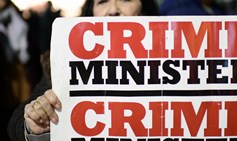
How to Eradicate Government Corruption
Written By: Adv. Edna Harel Fisher, Prof. Yuval Feldman
Among other things, government corruption deals a blow to the country’s economic vitality, and makes it less attractive to investors and entrepreneurs.

We the People: Democracy in the Age of Populism
Written By: Prof. Yuval Shany
Populism means different things to different people – and political populism has an even more sinister meaning

Wanted: A Minister of Transparency
Written By: Adv. Alona Vinograd
Government transparency means responsibility and accountability – core values that should be independent of political agenda

So Few MKs, So Much to Do: The Knesset is Dysfunctional
Written By: Dr. Chen Friedberg
Lawmakers sit on too many committees and propose too many laws. The fix starts with government members quitting the Knesset

The 20th Knesset in Numbers
Written By: Dr. Chen Friedberg, Avital Friedman, Niv Shoval
The current paper presents data on the parliamentary work of the MKs and parties in the outgoing Knesset. All the information is based on data taken from the Knesset archives and the Knesset’s Research and Information Center which are open to the public

It’s time to change how we select Knesset candidates
Written By: Prof. Gideon Rahat
Primaries often don't reflect the true will of actual party supporters -- voters should weigh in on Election Day

On Political Appointments of Legal Advisers in Government Ministries
Written By: Yohanan Plesner , Prof. Yuval Shany, Prof. Yedidia Z. Stern
The Israel Democracy Institute ahead of the Knesset Constitution Committee debate on political appointments of legal advisers in government ministries: "A blow to the civil service ethos; an opening for potential corruption, forsakes public interest".
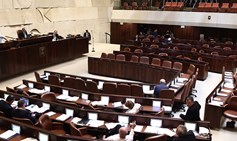
A Storm in a Teacup
Written By: Dr. Chen Friedberg, Dr. Assaf Shapira
Statesmanship or lack thereof has been in the background of a long list of scandals and incidents that have rocked Israeli politics in recent years

The Knesset at Age 69: Still Struggling for the Public's Trust
Written By: Lahav Harkov
While members of Knesset represent Israel's diverse society, they're still seen as self-interested and ineffectual by the public.

IDI Presents Outstanding Parliamentarian Award to MKs Elharar and Folkman
Knesset Speaker MK Yuli Edelstein: "It's time to bring the rules of the game back to the Knesset

At The Close Of The Winter Session Of Knesset: Only 17% Of Israelis Believe The Knesset Properly Represents The Public
As the Knesset winter session comes to a close, and a year into the 20th Knesset, the image of the Parliament and its members continues to suffer. On Tuesday, a new caucus will be launched with the purpose of proposing ways to improve the image of the Knesset and its members.

Improving the Image of the Knesset
Yesterday, a team of Israeli leaders met with President Reuven Rivlin at his residence to form a new caucus focused on restoring the public's faith in Israel's Parliament. The caucus, led by MK Elazar Stern, will work together with the Israel Democracy Institute to improve the Knesset's image.
"The Knesset is one of the most important institutions in our democracy. Improving its ability to function and its image in the eyes of the public is of extreme national importance," said IDI President Yohanan Plesner.

July 2014 Peace Index

The Israeli Democracy Index A Periodic Check-Up
Written By: Prof. Tamar Hermann
Each year, the Israel Democracy Institute checks the health of Israeli democracy by means of the annual Israeli Democracy Index. In an op-ed in Yedioth Ahronoth, Prof. Tamar Hermann discusses the 2013 Index, which was submitted to President Shimon Peres on October 6, 2013.

The Israeli Democracy Index: A Periodic Check-Up
Written By: Prof. Tamar Hermann
Prof. Tamar Hermann, head of IDI's Guttman Center for Surveys, discusses the findings of the 2013 Israeli Democracy Index, which was submitted to President Shimon Peres on October 6, 2013.

The Finest or Worst Hour of Israeli Politics?
The nocturnal formation of a new coalition, just as legislation to dissolve the Knesset was about to be passed, left many wondering if this was Israeli politics at its best or at its worst. Dr. Dana Blander explores both sides of this episode, which is likely to redefine what is forbidden, permitted, and worthwhile in Israeli politics.

Decade in Review: A Story of Disenchanted Lovers
Written By: Prof. Tamar Hermann
IDI Senior Fellow Professor Tamar Hermann explores developments in the relationship between the Israeli public and the political establishment, in an article that was published at the end of the third millennium as part of a collaboration between IDI and Walla!, a popular Israeli website.

Anti-Politics
Written By: Hila Zaban, Yuval Lebel, Prof. Tamar Hermann
Anti-politics is the aversion of citizens to political institutions and elected political figures. In this article, IDI Senior Fellow Prof. Tamar Hermann and IDI researchers Yuval Lebel and Hila Zaban survey different types of anti-politics, distinguish between anti-politics and de-politicization, and present insights about Israeli anti-politics based on the findings of the 2008 Israeli Democracy Index.

Heading into 2008
Written By: Dr. Arye Carmon
Dr. Aryeh Carmon on emerging anti-political sentiments in Israel. He calls upon the Israeli public and media to show their sense of responsibility to politics by renewing their participation in its processes.

Immunity Flowchart
Prime Minister Benjamin Netanyahu has asked the Knesset for immunity from prosecution. What happens next? IDI experts lay out the next steps.

Proper Representation - Let's Play!
As the Knesset celebrates its 69th birthday on Tuesday, Jan. 30, here is a chance to see how you score on knowledge of Israel's parliament. What did Israel's lawmakers do before joining the Knesset? What did they do after leaving? what are the benchmark requirement to becoming an MK? How many are currently serving their first term? Let's play!

There is Still Hope for Knesset Reform
Written By: Yohanan Plesner
When legislators exhibit such disdain for the country’s legislative body, is it any wonder the average citizen does too?
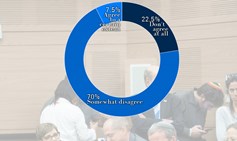
What Do Parliamentary Aides Think of the Work of Members Of Knesset?
Researchers surveyed aides in 40 Knesset offices. Of those, 92% of aides says they think MKs do not come prepared for Knesset committee meetings and that the Knesset is not succeeding in properly supervising the government (95%).

Happy Birthday, Knesset!
Written By: Prof. Ofer Kenig
As the Knesset, Israel’s legislature, marks its birthday, IDI takes the opportunity to consider two aspects about it: its members’ social composition and its relative size.


